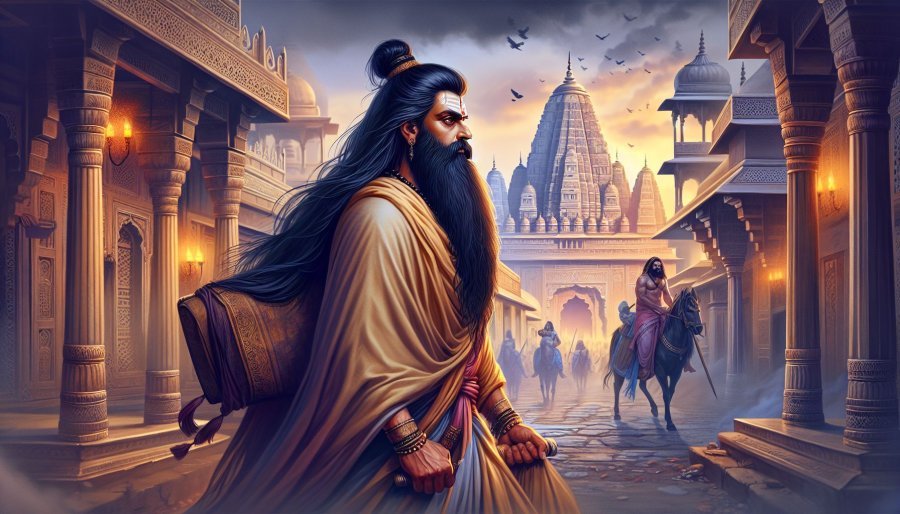Section VI - Dhritarashtra Repents and Reconciles with Vidura
Book index: Mahabharata (English)
This page contains a summary of the Mahabharata Section VI including examples of moral lessons in daily life. The Maha-Bharata is one of the largest epics ever written containing roughly 100,000 Sanskrit verses. It deals with the legendary history of ancient India and contains a large number of interwoven tales.

Short summary of the chapter:
After Vidura leaves for the Pandavas' abode, Dhritarashtra realizes his mistake and repents for his actions. He feels immense grief and sends Sanjaya to bring Vidura back, expressing deep regret for his previous anger. Sanjaya finds Yudhishthira in the Kamyaka woods, where he and Vidura are surrounded by Brahmanas and protected by his brothers. Yudhishthira receives Sanjaya respectfully and learns about Dhritarashtra's desire for Vidura to return.
Sanjaya conveys Dhritarashtra's message to Vidura, who, out of loyalty to his family, agrees to return to the city of Hastinapura. Dhritarashtra is overjoyed to see Vidura again and asks for forgiveness for his previous behavior. Vidura graciously forgives the king, expressing his deep affection for both the Kauravas and the Pandavas. The reunion between the two brothers is filled with heartfelt apologies and understanding, bringing happiness to both parties.
The reconciliation between Vidura and Dhritarashtra highlights the power of forgiveness and the importance of familial bonds. Vidura's forgiveness and willingness to return show his altruistic nature and his commitment to doing what is right. Dhritarashtra's repentance and apology demonstrate his growth and realization of the value of relationships over pride and ego. The emotional reunion between the brothers signifies a turning point in their relationship, paving the way for a more harmonious future.
The interaction between Vidura and Dhritarashtra emphasizes the themes of forgiveness, redemption, and the strength of family ties. The mutual respect and understanding between the two characters serve as a lesson in humility and reconciliation. Vidura's decision to forgive and return to Dhritarashtra reflects his deep sense of duty and morality, while Dhritarashtra's remorse and apology showcase his capacity for change and growth. Their renewed bond symbolizes the potential for healing and reconciliation in even the most strained relationships.
Overall, the story of Vidura's return to Hastinapura and the reconciliation with Dhritarashtra serves as a powerful example of the transformative power of forgiveness and understanding. It illustrates the importance of letting go of past grievances and embracing reconciliation for the betterment of all parties involved. Vidura and Dhritarashtra's renewed relationship sets the stage for a more harmonious future, rooted in mutual respect, forgiveness, and familial love.
Full English translation:
This page is merely a summary which is automatically generated. If you are looking for authentic sources such as the Sanskrit text or the Full English translation of Mahabharata Section VI - Dhritarashtra Repents and Reconciles with Vidura, have a look at the following articles:
Section VI, online text
English translation by Kisari Mohan Ganguli.
Read this and other chapters online.
Mahabharata (English Summary)
by Kisari Mohan Ganguli | ISBN-10: 8121505933
Buy the latest edition:
FAQ of Mahabharata, Section VI:
What was Dhritarashtra's reaction upon realizing his mistake regarding Vidura?
Dhritarashtra deeply regretted his actions and urgently called for Vidura's return.
How did Yudhishthira react to Sanjaya's message from Dhritarashtra?
Yudhishthira allowed Vidura to return to the city at Dhritarashtra's request.
How did Vidura respond to Dhritarashtra's apology?
Vidura forgave Dhritarashtra, expressing his eagerness to be reunited with him.
Daily life: Dhritarashtra Repents and Reconciles with Vidura:
In our daily lives, we can draw inspiration from the story of Dhritarashtra's repentance and Vidura's forgiveness, emphasizing the importance of acknowledging our mistakes and valuing relationships over pride. When one realizes an error in judgment or action, just like Dhritarashtra, it's crucial to not let ego cloud one's judgment and to seek forgiveness from those we have wronged. This story teaches us that admitting mistakes and showing vulnerability is a strength, not a weakness.
Furthermore, Vidura's graciousness in forgiving Dhritarashtra and returning to him highlights the noble act of forgiveness. He demonstrates that understanding and empathy towards others' shortcomings can heal relationships. In our interactions, being quick to forgive, rather than holding onto grudges, nurtures healthier and more fulfilling relationships.
Lastly, the story underscores the value of supporting those in distress, just as Vidura showed partiality to the Pandavas in their time of need, not out of bias, but out of a genuine concern for their well-being. It reminds us to extend our care and support to those around us who are struggling, fostering a community of compassion and mutual respect. In essence, acknowledging our faults, seeking forgiveness, offering forgiveness, and supporting each other through difficulties are key lessons we can incorporate into our lives for improved interpersonal relationships.
